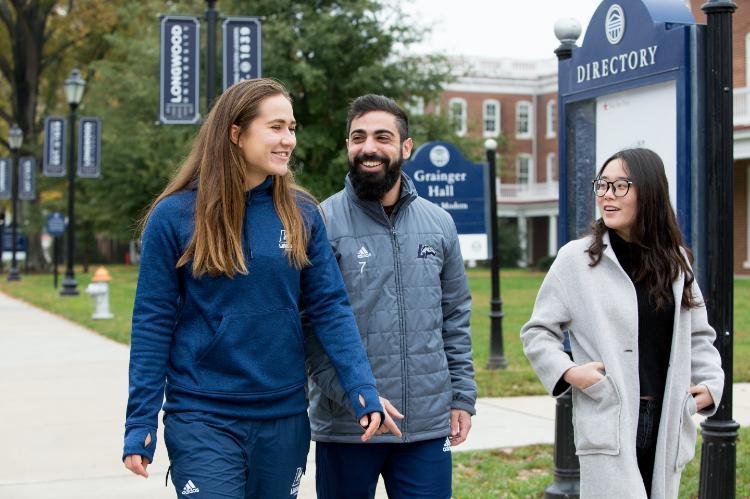
Resources
About the American Culture & Values

Studying at Longwood University in the United States will be a great learning experience. You will learn and practice English in and out of the classroom, as well as learn about American life and culture.
At Longwood you’ll learn a lot about how Americans live and learn, both in and out of the classroom. As you learn and practice the English language and experience life in the United States it can sometimes seem that Americans live in a confusing culture. Not to worry, we’re here to help.
Here are a few things we think may be helpful to know as you prepare for your experience.
First, it is important to remember that the U.S is made up of diverse ethnic groups and cultures, we share a lot of the same values but also, some individuals and groups have a set of respected values that are quite different from others.
The American society consists of varied ethnic groups and these groups have helped to shape our culture and many American values come from various cultures.
Adjustment & Culture Shock
You may notice these American values are different than your own. When you come to the U.S. the reality of these differences will be more evident. You will likely experience culture shock as you learn to adjust to being here and a new way of living. This requires time and patience.
Typical U.S. American Values
Individuality: According to Geert Hofstede, who studied cultures and workplace norms, https://geerthofstede.com/landing-page/, found that the American culture is individualistic which means that Americans tend to be self-reliant and display initiative. Individuals are rewarded for hard work and what they can do versus the team.
Competition: The American society is driven by competition, success and achievement. Success is generally defined as the winner. Generally, actions in school, work and play are based on values that people need to both be and do their best. Americans for the most part, live to work. https://www.hofstede-insights.com/country-comparison/the-usa/
Communication: American’s believe in “liberty and justice for all,” evidenced by equal rights. Communication is informal, direct and participative. Americans are used to interacting with people they do not know well and easily prospective counterparts to gain information. Americans tend to be less expressive than other cultures. Yet the freedom of expression is encouraged. In addition, Americans are usually tolerant of ideas and other’s opinions. https://www.hofstede-insights.com/country-comparison/the-usa/
Time: Americans value time. At Longwood, it is important to be on time for class and appointments. In most cases, Americans apologize if they are late. Some instructors will mark students absent if they have arrived five minutes past the class starting time. At Longwood University, students may leave if the professor has not arrived within 15 minutes after the start time of class.
Informality: The U.S. American lifestyle is generally casual. You will see students going to class in shorts and t-shirts. Male instructors seldom wear a tie and some may even wear blue jeans. Female instructors often wear slacks along with comfortable walking shoes.
Greetings and farewells are usually short, informal and friendly. Students may greet each other with "Hi", "How are you?" or "What's up?" Farewells can be as brief as: "See you," "Take it easy," or, "Come by some time." (not to be taken literally). Friendships are also casual, as Americans seem to easily develop and end friendships.
Achievement & Hard Work/Play: International students find the achievement-oriented value to be interesting. A competitive spirit is often the motivating factor to work harder. Americans often compete with themselves as well as others. They feel good when they "beat their own record" in an athletic event or other types of competition. Americans seem to be "on the go," because sitting quietly doing nothing seems like a waste of time.
Direct & Assertive: Americans try to work out their differences face-to-face. They are encouraged to speak up and give their opinions. Professors expect students challenge or disagree with certain points in the lecture. This manner of direct speaking is often interpreted by international students as rude.
Looking to the Future and to Change: At times, children are often asked what they want to be "when they grow up"; college students are asked what they will do when they graduate, and professors plan what they will do when they retire.
Change implies progress and holding on to traditions seems to imply old and outdated ways.
Read more about U.S. Academic Culture .
American University Classroom Norms
One of the keys to success at a US university is learning the cultural etiquette and basic rules (both official and unspoken).

University classes in America are highly participative and learner-centered.
You are expected to:
- take notes
- work in groups
- present what you have learned
Customs and societal expectations vary from country to country, and within the university classroom is no exception. A clear idea of what to expect when you study at an American university will help you feel more comfortable and ultimately get a better education, receive higher grades and have a more rewarding experience.
Participation
Here at Longwood University, we hands-on where students are engaged in discussions and group work. Many international students have told us class attendance was not important. However, when studying at both Longwood and an American university, professors expect you to speak up and participate (and will gain much more from the class when you do so). Most often, students will raise their hands and wait to for the professor to call on them. In some classes, students take turns speaking out in a more conversational format because you will likely find the US university environment more interactive than at home, you will need to take initiative to stand out and be heard.
Classroom Atmosphere
Many international students find our classroom atmosphere to be more informal and relaxed than the environment in their home countries. Still, politeness and respect are expected and appreciated and will help you succeed when studying here. Most professors require you to arrive at class and turn in assignments on time. Distractions like cell phones and laptops (except when being used for classwork) are discouraged or disallowed, but many classes allow eating and drinking. Professors will generally explain the rules for their classroom at the beginning of the semester and in the course syllabus.
Honor Codes
At Longwood University, we have an Honor Code which consists of sets of rules and expectations that govern what the school considers to be ethical behavior in the community. Students are expected to follow the honor code and act in a trustworthy manner. Consequences for violations such as plagiarism, cheating and lying are enforced by a university council.
Plagiarism
Plagiarism is defined as representing another’s ideas as your own. In the United States, intellectual property laws and ideals are highly respected and taken very seriously. It is considered ethically wrong to use someone else’s ideas or words without giving credit. All US universities have rules against plagiarism and have consequences for violations—being aware of this expectation and using citations (references to sources quoted in your assignment) will help you succeed when you study Longwood University.
Good Wishes for a New Cultural Experience
Your decision to study in the United States will provide you with endless opportunities to learn about a new culture and about yourself as well. You will also have a chance to educate U.S. Americans about your own country and cultural values.
